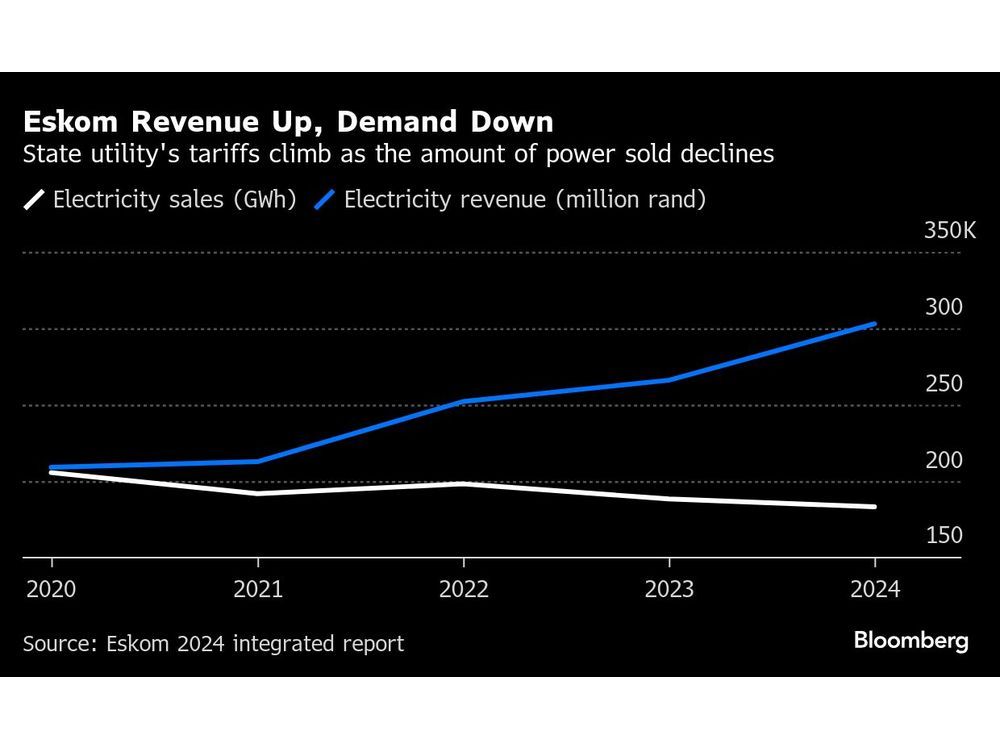Top Stories
Eskom Secures 54 Billion Rand Settlement, Power Prices Rise 8.76%

South Africa’s energy regulator has approved a significant increase in electricity prices, allowing Eskom Holdings SOC Ltd. to raise rates by 8.76% from April 1, 2024. This decision follows a successful settlement in which Eskom challenged a previous ruling by the National Energy Regulator of South Africa (Nersa). The settlement amounts to 54 billion rand (approximately $3.1 billion), marking a pivotal moment for the state-owned utility.
The increase in prices will exceed the central bank’s inflation forecast of 3.3% for the coming years, raising concerns about the financial strain on consumers. In a statement, Nersa confirmed that this revised price hike stands in contrast to the original planned increase of 5.36%. Eskom’s legal challenge aimed to address a perceived revenue shortfall identified by the utility, which claimed Nersa’s earlier tariff decision was based on incorrect data.
Implications for Consumers and the Economy
The rise in electricity prices comes at a time when South Africa has witnessed a decline in demand for power, partly due to increased adoption of solar energy among consumers. Over the past four years, the volume of electricity sold has dropped by 11%, as many households seek alternatives amid ongoing power shortages. This situation has put additional pressure on Eskom, which has been working to stabilize its electricity supply and reduce the frequency of power cuts that have adversely affected the economy.
Despite these challenges, Eskom has made strides in improving the reliability of its coal-fired power stations and stabilizing the national grid. The utility is also exploring ways to enhance its competitive edge against private renewable energy providers. One of its strategies involves expanding its own green-power capabilities and soliciting proposals from large-scale users for purchasing solar-generated electricity.
Future Outlook and Regulatory Changes
Eskom’s settlement with Nersa includes provisions for a further price adjustment of 8.83% in the year starting April 1, 2027, replacing an earlier planned increase of 6.19%. While the higher prices aim to reflect actual costs, they may inadvertently encourage illegal electricity connections, according to a presentation by South Africa’s auditor-general. Eskom has highlighted the necessity of cutting operational costs and improving debt collection from municipalities to ensure financial sustainability.
As part of ongoing reforms, the South African government is advancing plans to restructure Eskom into separate entities focused on transmission, generation, and distribution. This shift is intended to create a more competitive environment that could potentially lower prices for consumers in the long run.
Eskom’s ongoing legal actions regarding trading licenses have faced criticism from business lobby groups and government officials. Electricity Minister Kgosientsho Ramokgopa has urged the utility to reconsider its legal stance, suggesting that a withdrawal could better serve the interests of low-income customers by maintaining a broader base for cross-subsidization.
In summary, the recent settlement and subsequent price hike represent a critical juncture for South Africa’s energy landscape. As Eskom navigates the complexities of financial recovery while adapting to consumer demands, the implications of these changes will be closely monitored by stakeholders across the country.
-

 Science2 months ago
Science2 months agoToyoake City Proposes Daily Two-Hour Smartphone Use Limit
-

 Health2 months ago
Health2 months agoB.C. Review Reveals Urgent Need for Rare-Disease Drug Reforms
-

 Top Stories2 months ago
Top Stories2 months agoPedestrian Fatally Injured in Esquimalt Collision on August 14
-

 Technology2 months ago
Technology2 months agoDark Adventure Game “Bye Sweet Carole” Set for October Release
-

 World2 months ago
World2 months agoJimmy Lai’s Defense Challenges Charges Under National Security Law
-

 Technology2 months ago
Technology2 months agoKonami Revives Iconic Metal Gear Solid Delta Ahead of Release
-

 Technology2 months ago
Technology2 months agoSnapmaker U1 Color 3D Printer Redefines Speed and Sustainability
-

 Technology2 months ago
Technology2 months agoAION Folding Knife: Redefining EDC Design with Premium Materials
-

 Technology2 months ago
Technology2 months agoSolve Today’s Wordle Challenge: Hints and Answer for August 19
-

 Business2 months ago
Business2 months agoGordon Murray Automotive Unveils S1 LM and Le Mans GTR at Monterey
-

 Lifestyle2 months ago
Lifestyle2 months agoVictoria’s Pop-Up Shop Shines Light on B.C.’s Wolf Cull
-

 Technology2 months ago
Technology2 months agoApple Expands Self-Service Repair Program to Canada









